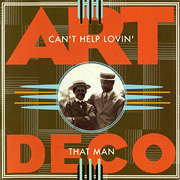
Can’t Help Lovin’ That Man
1993: Legacy/Sony/Columbia 52855
Bud Freeman & His Orchestra, Red McKenzie, vocal, Chicago, 3 December 1928
Merritt Brunies & His Friars Inn Orchestra, Lew King, vocal, Chicago, 2 March 1926
Earl Gresh & His Gangplank Orchestra, New York, 22 September 1925
Golden Gate Orchestra, “Jim Andrews,” vocal, New York, 24 September 1929
The Flamingo Melodians, Bill Coty, vocal, New York, 15 May 1930
Fred Rich & His Orchestra, The Rollickers, vocal, New York, 15 November 1929
Sam Lanin’s Famous Players, “George Beaver,” vocal, New York, 9 December 1927
Ray Ventury & His Collegians, Edoard S Foy, vocal, Paris, 16 May 1929
Bing Crosby, New York, 27 September 1929
The Travelers, Irving Kaufman, vocal, New York, 19 June 1929
The Georgians, Johnny Morris, vocal, New York, 22 November 1929
The Clevelanders, “Rodman Lewis,” vocal, New York, 17 February 1930
Dick Cherwin & His Orchestra, Billy Murray, vocal, New York, 27 September 1929
Harold Lem & His Orchestra, Smith Ballew, vocal, New York, 29 October 1930
Frankie Trumbauer & His Orchestra, Smith Ballew, vocal, New York, 19 October 1929
The Travelers, Wes Vaughn, vocal, New York, 7 November 1930
Meyer Davis & His Orchestra, Scrappy Lambert, vocal, New York, March 1929
The Columbians, Irving Kaufman, vocal, New York, 5 November 1928
Danny Yates & His Orchestra, Smith Ballew, vocal, New York, 23 October 1930
The Hotchkiss Dance Orchestra, The Kissing Bandits, vocal, New York, 1 April 1931
Joe Haymes & His Orchestra, Phil Dooley, vocal, New York, 23 June 1932
Will Osborne & His Orchestra, Will Osborne, vocal, New York, 29 June 1933
Guy Lombardo & His Royal Canadians, Carmen Lombardo, Larry Owen, & Fred Higman, vocal, New York, 7 September 1932
Cliff Edwards, New York, 13 October 1933
Paul Whiteman & His Orchestra, Bob Lawrence, vocal, New York, 29 June 1934
The liner notes on this “Art Deco” series release are kind of a mess, half documentary and half (irrelevant) editorial. The editorial part is largely a brief essay on Gay identity in popular music…except that only a couple of tracks on this CD have any such thing, and those only in a mock-the-limp-wrists way; particularly unhelpful is writer Michael Musto’s attempt to tie this all to Gay Liberation and 1980s/1990s pop music and, worse, to then make THAT all about dance clubs, and practically crediting Madonna for it all on top of that.
What Musto does rightly hint at, but then abandons to push his pop-culture agenda, is a brief explanation of the charm and thrill of the rest of this CD’s tracks: how they can serve to fill an unmet need of men for whom popular music didn’t provide such romantic fluff as the straight folks got. I suppose that applies as much to the men of the day (most of these tracks date from a few years right around 1930) as to us later chaps who’d love to have a corny old tune for our swain to croon (or to serenade one with). When you don’t have pop-culture representation, the alienation can be very dispiriting; so these tracks, even though they obviously weren’t intended as same-sex-love odes, provide a sort of vicarious satisfaction.
Personally, I kind of include Frank Sinatra’s recording of “Don’t Cry, Joe” (which I have on Disc 4 of the generally lackluster “Best of the Columbia Years” box set) as a cousin of this family; although the lyrics aren’t gender-specific with regard to the singer (“Joe” is presumably a male soldier, although I suppose that could be lit a bit differently, too, for that matter), and it’s assumed that the singer is a fellow soldier merely sympathizing and advising “Don’t cry, Joe; let her go, let her go, let her go,” I confess I enjoy hearing the song with the notion in place that Sinatra’s singing with a bit more of a consoling tone for his pal than just advising that “aw, dames are a dime a dozen—get another”…rather, that he’s stepping up to the plate to walk his pal over to behind the grandstand, as it were, where Joe will soon happily forget ALL about that dame.
But that’s just me.
Comments © 2005 Mark Ellis Walker, except as noted, and no claim is made to the images and quoted lyrics.